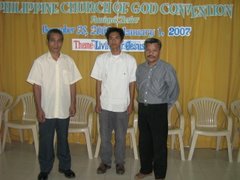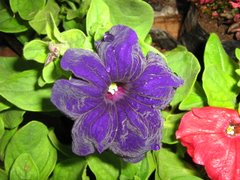Consciousness of God’s Presence
Happy and blessed is the soul that is conscious of God’s sweet indwelling presence. Being conscious of God’s presence is what the Psalmist meant when he said, “O taste and see that the Lord is good.” (Psalm 8) “Tasting God” is an expression incomprehensible to the unregenerate. Those who have tasted Him comprehend the meaning of this expression better than they can tell it. When a bit of sugar is placed upon the tongue there is experienced a sweetness in the sense of taste. When the soul tastes of God there is experienced a sweetness in the spiritual being. The sweetness of God’s presence in the soul is as much more glorious than the sweetness of sugar to the taste, as spiritual and heavenly things are above literal and earthly things. God and His word are inseparable, or the word is God; therefore, when the Psalmist says, “How sweet are thy words unto my taste! yea, sweeter than honey to my mouth,” (Psalm 119:103) it is in reality tasting the sweetness of God.
The awakened soul thirsts for this sweetness of the divine presence. Nothing else can satisfy it. The wealth and pleasure of the world do not contain a sweetness sufficient to satisfy the heart of man. It is only God that can fill the hungry soul with goodness. The divine life sheds peace and light and rest in the soul. Man receives the divine presence into his spiritual being when he is quickened by the Spirit. In the Word of God it is termed “[passing] from death unto life,” (John 5:24; I John 3:14) and “being born again.” (I Peter 1:23) In sanctification, when a revolution is effected in the nature of man and he becomes a partaker of the divine nature, it is then he is conscious of the fullness of the divine presence and is at rest. Glory be to God!
To possess the divine presence in its fullness is not the end of the Christian race. There are certain conditions for man to meet in order to possess this glorious inheritance, and there are certain conditions for him to meet in order to retain it. Not only is man able, in the economy of grace, to retain the sweet consciousness of the divine presence in the soul, but in his hands are placed instruments that enable him to cultivate and deepen this consciousness and thus add glory to glory and cause his way to shine “more and more unto the perfect day.” (Proverbs 4:18) Oh, how many Christians would enjoy more of heaven’s glory in their souls, if by careful cultivation they would increase the sense of the divine presence! Dear pilgrim, have you reached the land where is an “eternal weight of glory” (II Corinthians 4:17) or the regions of “joy unspeakable” (I Peter 1:8)?
To cultivate or deepen the sense of the divine presence requires an almost constant effort. Right at this point is where perhaps more Christians have failed to do what was required of them than at any other; and consequently experience less joy and power than formerly. There are many things employed by Satan to weaken this consciousness of God. Looseness of thought, moments of idleness, or yielding to self, serve to weaken the reverential feeling in our hearts toward Him. A little attention to the world, a little thought for the morrow, a little anxiety, a little too much talking—these things destroy the consciousness of the divine presence in the soul, and rob us of spiritual power and rest. Living before God in prayer, holy and pure thoughts, the entertaining of right feelings toward God and man, acts of benevolence and self-sacrifice for the benefit of others, develop and fashion the soul more and more into the beauty of the divine life.
It is the privilege of the saint so to walk in the presence of God and live in holy communion with Him as to draw God’s glory and life into his own, and give him a feature very distinguishing for ordinary natural man. If we wish to be like Jesus and enjoy the sweet consciousness of His presence, we must live with Him in prayer. As we improve the health and strength of our physical being by proper food and exercise, so we improve the strength and beauty of our spiritual being by proper meditation and prayer.



















































































































No comments:
Post a Comment